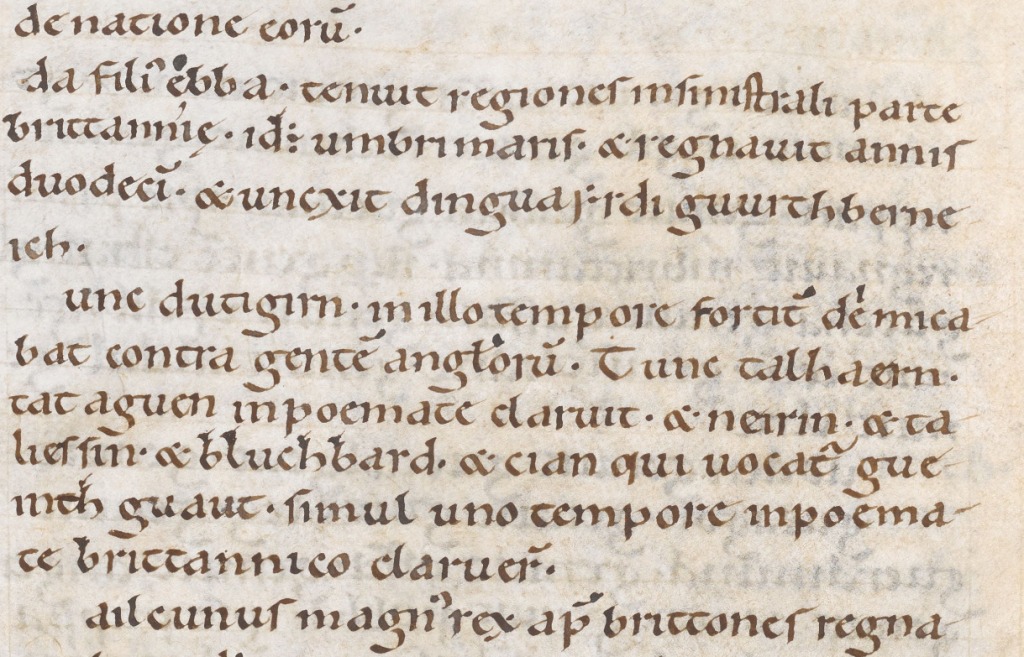There were two Rhydderchs that have been conflated. The first was Rhydderch Hael, i.e. Rhydderch the Generous of Gwynedd, who appears in BGG 8 while the second was Rhydderch Hen, i.e. Rhydderch the Old of Strathclyde, in HG 6. ByS 18 indicates that Dyfnwal Hen, a great-grandfather, of Rhydderch Hael according to BGG 8, was a grandson of Macsen Wledig:
| Gen. |
ByS 18 seg.
|
|
BGG 8 |
Pen. 268 |
| -5 |
Maxen wledic |
|
|
Makssen wledig |
| -4 |
Ydnyuet |
|
|
Ednyfed |
| -3 |
Dyuynyeual hen |
|
Dyuynwal hen |
Morhen? |
| -2 |
Kedic |
|
Kedic |
Predur |
| -1 |
Senyllt |
|
Tutwal Tutclyt |
Elvfed |
| 0 |
Nud hael |
Lewdwn lluydawc |
Rhyderch Hael |
|
| 1 |
Dyngat |
Thenoi |
|
|
| 2 |
Lleudat |
|
|
|

Rhydderch Hael’s sword, Dyrnwyn meaning ‘White-hilt’, is the first listed of The Thirteen Treasures of the Island of Britain.[1] The reason he was called generous was because he would give his sword to anyone who asked for it. However, it was always returned when it was realised that if it was drawn by any well-born man it would burst into flame. The Chirk Codex of the Welsh Laws states that he was one of the kings involved in the failed attempt to avenge the death of Elidir Mwynfawr.
Note, ByS 18 mentions other sons of Dingad of gen. 1 apart from St. Lleuddad. They have not been shown in the above chart. Although his father-in-law, Lleuddun of gen. 1, ruled in Edinburgh, this is a southern pedigree as indicated by the fact that the Buchedd Llewddoc Sant says Dingad was king of Bryn Buga, i.e Usk. St. Lleuddad succeeded Cadfan as abbot of Bardsey.
Dreon Lew was the son of Nudd Hael and is mentioned in triad 31 W :
“and the Retinue of Dreon the Brave at the Dyke of Ar(f)dery(dd)”
This allows us to give a floruit for him of 573, the date of the battle of Arderydd according to the AC. His father appears in triad 2:
“Nudd the Generous, son of Senyllt”
ByA 18 mentions brothers of Rhydderch Hael, including Morgan Mwynfawr, i.e. Morgan the Wealthy. Triad 20 calls him, together with Arthur, one of the Three Red Ravagers of Britain since wherever he went neither grass nor plants grew for a period. He is said to have owned the fourth of The Thirteen Treasures of Britain. It was a chariot which would rapidly take whoever was in it wherever they wanted.
Rhydderch Hael’s father was Tudwal Tudclyd. Tudwal means ‘leader of the people’ and Tudclyd ‘defender of the people’.[2] His wife, according to Pen. 268, was Elufed and it can be seen from the above chart that they were second cousins. The Whetstone of Tudwal is the eighth of The Thirteen Treasures of Britain. While it would sharpen a brave man’s weapon, it would blunt that of a coward.
The Stanzas of the Graves tell us that Rhydderch’s grave is at Abererch, which is in Llŷn. The Cyfoesi Myrddin a Gwenddydd states that he was followed by the king Morgan Mawr ap Sadyrnin who, in turn, was followed by Urien.
The reason why the two Rhydderchs were conflated is because their fathers shared the same name and they were both descendants of Dyfnwal Hen. However, by comparing the table above with that below it can be seen their genealogies differ.
| Gen. |
HG 6 |
HG 8 |
HG 9 |
HG 10 seg.
|
|
| -4 |
|
Coel Hen |
Coel Hen |
|
Coel Hen |
| -3 |
Dyfnwal Hen |
[Ceneu] |
Ceneu |
|
[Ceneu] |
| -2 |
[Cynfelyn] |
Gwrwst Ledlwm |
[Mar] |
|
Garbanion |
| -1 |
Clinoch |
Meirchion Gul |
Maeswig Gloff |
|
Dyfnwal Moelmud |
| 0 |
Tudwal |
Cynfarch Oer |
Lleenog |
Cyngar |
Brân Hen |
| 1 |
Rhydderch Hen |
Urien Rheged |
Gwallog |
Morgan Fwlch |
|
| 2 |
|
|
|
Coleddog |
|
| 3 |
|
|
|
Morgan |
|
Rhydderch was one of the kings who, according to HB 63, fought against king Hussa of Bernicia. The V. Merlini implies he fought in the battle of Arderydd. V. Kentigerni 45 indicates he died soon after the saint, probably in the year 614 and as predicted in the V. Columbae he did not die in battle.
[1] Bromwich, R., 2006, 259
[2] Bromwich, R., 2006, 508


